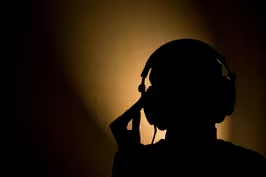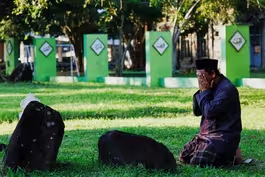
Trump asks Supreme Court to delay TikTok ban. What’s next?
Clip: 12/28/2024 | 5m 8sVideo has Closed Captions
Why Trump asked the Supreme Court to delay TikTok ban and what’s next
President-elect Donald Trump has urged the Supreme Court to block a law that would force the popular social media app TikTok to be sold or shut down. In a legal filing Friday night, Trump told the justices that a delay would allow his administration to “negotiate a resolution to save the platform while addressing national security concerns.” NPR’s Bobby Allyn joins Ali Rogin to discuss.
Problems playing video? | Closed Captioning Feedback
Problems playing video? | Closed Captioning Feedback
Major corporate funding for the PBS News Hour is provided by BDO, BNSF, Consumer Cellular, American Cruise Lines, and Raymond James. Funding for the PBS NewsHour Weekend is provided by...

Trump asks Supreme Court to delay TikTok ban. What’s next?
Clip: 12/28/2024 | 5m 8sVideo has Closed Captions
President-elect Donald Trump has urged the Supreme Court to block a law that would force the popular social media app TikTok to be sold or shut down. In a legal filing Friday night, Trump told the justices that a delay would allow his administration to “negotiate a resolution to save the platform while addressing national security concerns.” NPR’s Bobby Allyn joins Ali Rogin to discuss.
Problems playing video? | Closed Captioning Feedback
How to Watch PBS News Hour
PBS News Hour is available to stream on pbs.org and the free PBS App, available on iPhone, Apple TV, Android TV, Android smartphones, Amazon Fire TV, Amazon Fire Tablet, Roku, Samsung Smart TV, and Vizio.
Providing Support for PBS.org
Learn Moreabout PBS online sponsorshipALI ROGIN: Good evening.
I'm Ali Rogan.
John Yang is away.
President-elect Donald Trump has urged the Supreme Court to block a law that would force the popular social media app TikTok to be sold or shut down.
It's set to take effect the day before his inauguration.
The app has over a billion monthly active users.
TikTok has said more than 150 million are in the US.
But the Biden administration says TikTok poses grave national security threats because its China based parent company, ByteDance, is subject to the will of the Chinese Communist Party.
In a legal filing last night, Trump told the justices that a delay would allow his administration to negotiate a resolution to save the platform while addressing national security concerns.
Bobby Allyn is a technology correspondent for NPR.
Bobby, thank you so much for being here.
Let's remind folks, this law, this TikTok law just passed earlier this year.
Why did proponents of the law want to see it passed and how did TikTok respond?
BOBBY ALLYN, Technology Correspondent, NPR: So TikTok's problem has always been China.
Since the app surged in popularity in the pandemic, lawmakers in Washington have been really concerned because TikTok has ties to Beijing.
Its parent company is based in ByteDance.
And the fear has always been that the Chinese Communist Party can try to influence the app, right, by using the app to collect Americans data or to try to shape Americans views about the world.
So this law was passed that is forcing TikTok to shed its Beijing parent company or be banned nationwide.
ByteDance says TikTok isn't for sale.
So the law is set to take effect January 19th.
ALI ROGIN: And of course, we are now in this protracted legal battle get us up to speed on how that has been playing out and how this got to the Supreme Court so relatively quickly.
BOBBY ALLYN: So soon after the law was signed by President Biden in April, TikTok appealed and they made a First Amendment case, saying the Americans who use the app will have their free speech suppressed if this app is put out of business.
But the appeals court came back and said, you know what?
The national security case against TikTok is really compelling.
We're also very worried about China.
This law is valid.
So then TikTok appealed to the Supreme Court, and the Supreme Court looked at the appeal court -- appeals court decision and said, you know what?
This needs review.
And the Supreme Court set an emergency hearing on a lightning fast deadline.
So in a matter of weeks, the Department of Justice and lawyers for TikTok will be meeting in the Supreme Court to decide the fate of this app.
ALI ROGIN: And now, of course, President Elect Trump is getting involved with this letter.
What exactly is he asking for?
BOBBY ALLYN: It was a really stunning letter that surprised lots of legal observers across the political spectrum.
Basically, you know, Trump wrote a letter to the court saying, hey, Supreme Court, maybe you should hold off on your ruling and give me some time as President-elect to come into the White House and broker a deal that could result in the selling of TikTok.
It's a pretty extraordinary request given that Trump, right now, he is president-elect, but right now he's filing this motion as a private citizen.
Right.
He doesn't have any kind of legal authority to make this request, but he made it nonetheless.
And inside TikTok, they are thrilled because it was always a dice roll in terms of what would happen at the surprise Supreme Court.
But now we have the president elect saying, TikTok, don't worry, I'm going to rescue the app one way or another.
ALI ROGIN: So the president-elect has evolved on TikTok.
He wanted to ban it during his first administration.
Why now the reversal?
BOBBY ALLYN: So Trump has said publicly that TikTok helped turn out the youth vote.
But behind the scenes, something else has been happening.
There's a hedge fund manager named Jeff Yass in the Philadelphia area.
He and his company, Susquehanna International Group, have a $30 billion stake in ByteDance, the owner of TikTok.
And advisors close to Yass have been pushing Trump to see TikTok a little differently.
There is this big meeting between Trump and Yass in Florida in March, and shortly after, Trump started changing his tune.
ALI ROGIN: Very quickly, Bobby, do we have any indication of whether or not the Supreme Court's going to take this into account and respond to it?
BOBBY ALLYN: It's really hard to get inside the minds of the justices and know what might happen.
But regardless of what the Supreme Court decides, Trump is going to have a lot of power over TikTok.
Because if it is -- if the Supreme Court decides to reverse the law, well, then Trump can just say, fine, TikTok lives to see another day.
If the court decides to uphold the law, the law gives Trump tons of latitude to interpret it, and he might just interpret it in a way that never bans TikTok at all.
ALI ROGIN: That's NPR's Bobby Allyn.
Thank you so much for your insights.
BOBBY ALLYN: Thanks for having me.
The chart-toppers and breakthrough music artists of 2024
Video has Closed Captions
Clip: 12/28/2024 | 8m 13s | The chart-topping hits and breakthrough music artists of 2024 (8m 13s)
A look back at deadly Indian Ocean tsunami 20 years later
Video has Closed Captions
Clip: 12/28/2024 | 7m 55s | Looking back at the devastating Indian Ocean tsunami 20 years later (7m 55s)
Providing Support for PBS.org
Learn Moreabout PBS online sponsorship
- News and Public Affairs

FRONTLINE is investigative journalism that questions, explains and changes our world.

- News and Public Affairs

Amanpour and Company features conversations with leaders and decision makers.












Support for PBS provided by:
Major corporate funding for the PBS News Hour is provided by BDO, BNSF, Consumer Cellular, American Cruise Lines, and Raymond James. Funding for the PBS NewsHour Weekend is provided by...

